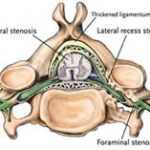The term myelopathy is used to describe any neurological deficit related to the spinal cord. The deficit(s) can be the result of either injury to the spinal cord or spinal degeneration, and symptoms associated with myelopathy can range from impaired sensation/movement and muscle weakness to paralysis and loss of organ function.
In most instances symptoms develop gradually, worsening over time if the source of the spinal deficit is not treated. The onset of these symptoms however may occur suddenly as a result of trauma.
Spinal Degeneration Causes
- Spinal stenosis – most common
- Disc herniation
- Bone spurs and arthritic changes
- Underlying conditions: diabetes, lupus or acquired immune deficiency syndrome (AIDS).
Symptoms
- Spinal Degeneration: Increased difficulty when trying to do normal activities, particularly those that require coordination or fine-motor skills (picking up and/or holding objects) is often the first sign. The longer the source of the injury remains untreated, the greater the potential for permanent nerve damage.
- Spinal Trauma: total or partial loss of sensation, movement and function in the muscles, tissues and organs served by the nerves originating in the area of the spinal cord affected by the injury. Injury to the upper areas of the spinal cord can result in myelopathy that affects multiple systems in the body.
Diagnosis
To determine if myelopathy is the cause of your symptoms, your doctor may, in addition performing a physical exam, recommend a diagnostic test such as a computed tomography (CT) scan or magnetic resonance imaging (MRI).
Treatment
When myelopathy has been diagnosed, spine surgery is typically recommended for patients who show evidence of muscle weakness caused by spinal cord compression. The goal of surgery is alleviate your symptoms and prevent further damage by removing the source of pressure on the spinal cord.
- Spinal Decompression (minimally invasive if appropriate)


